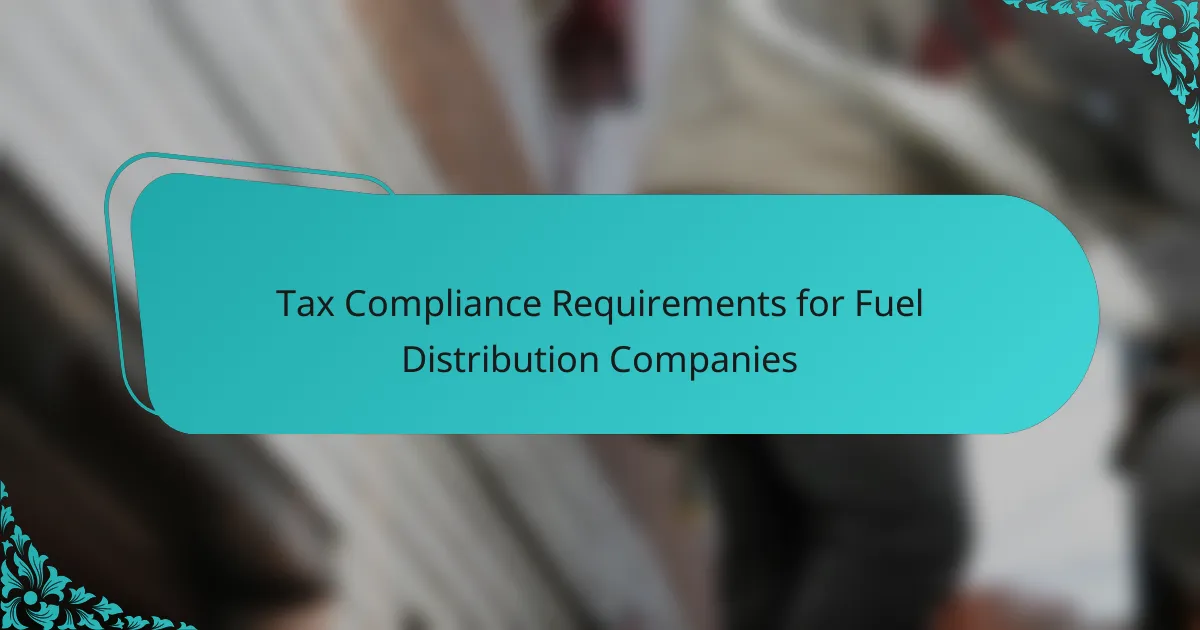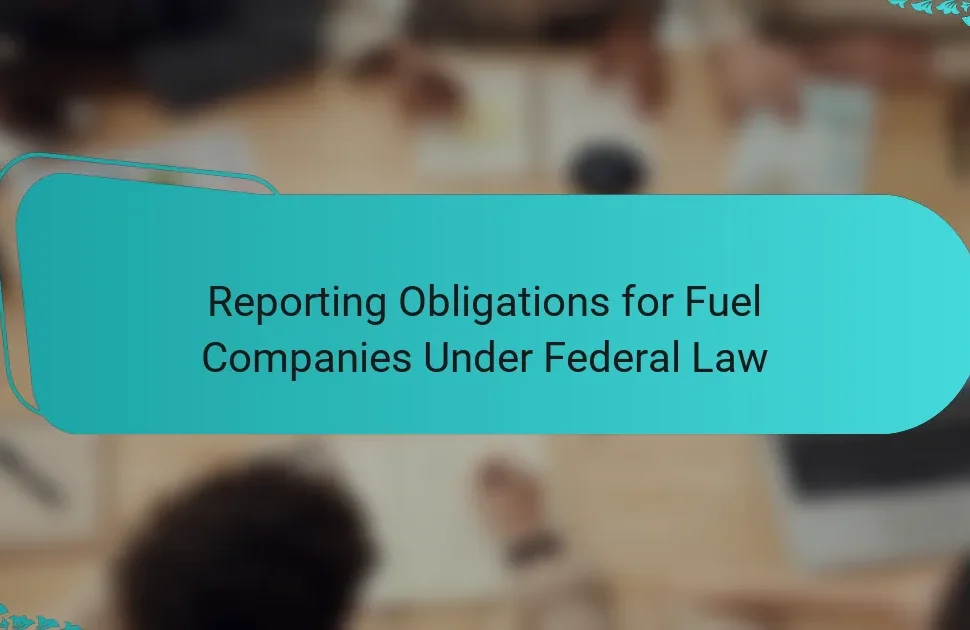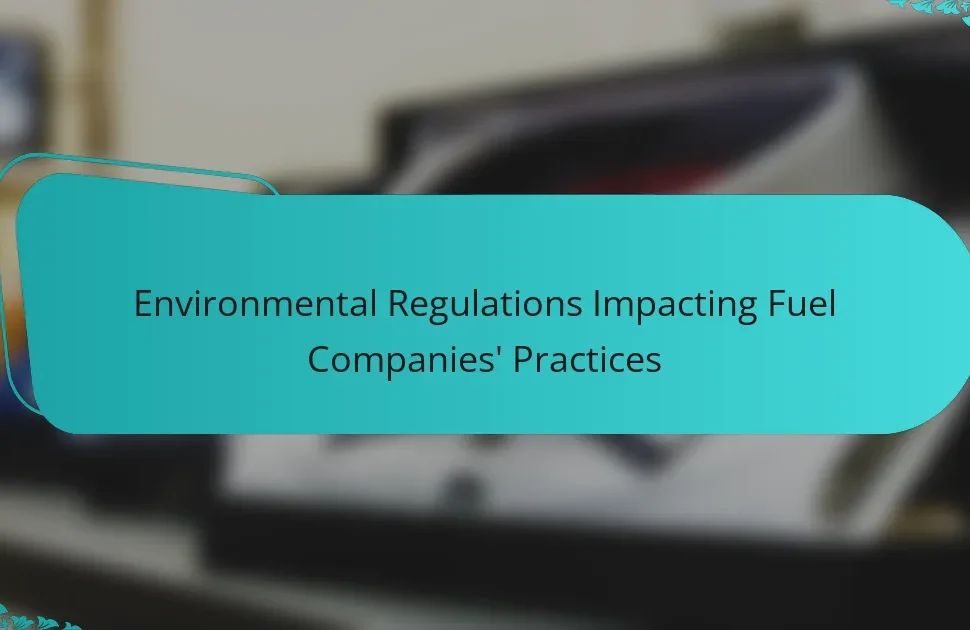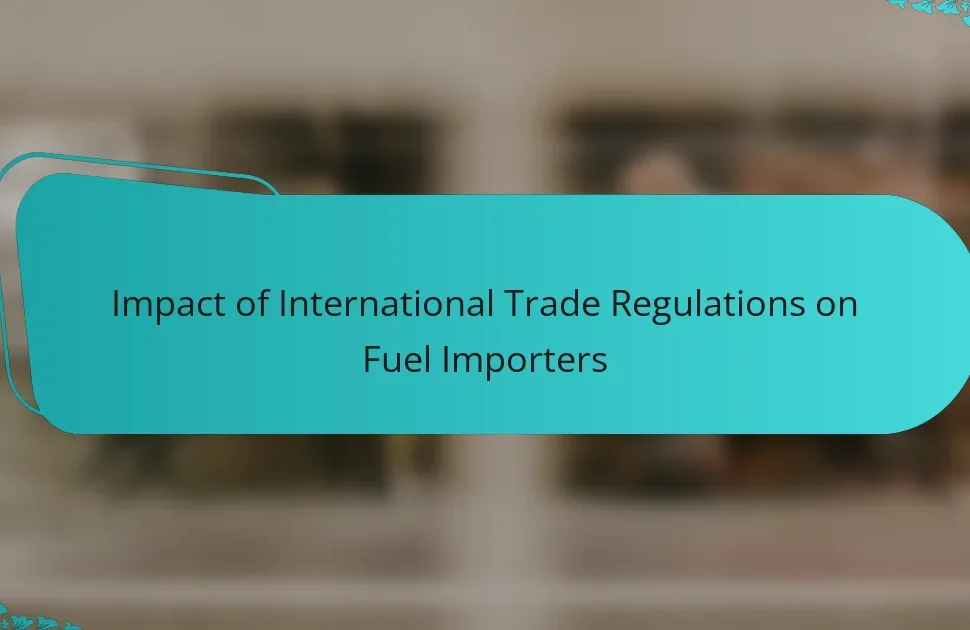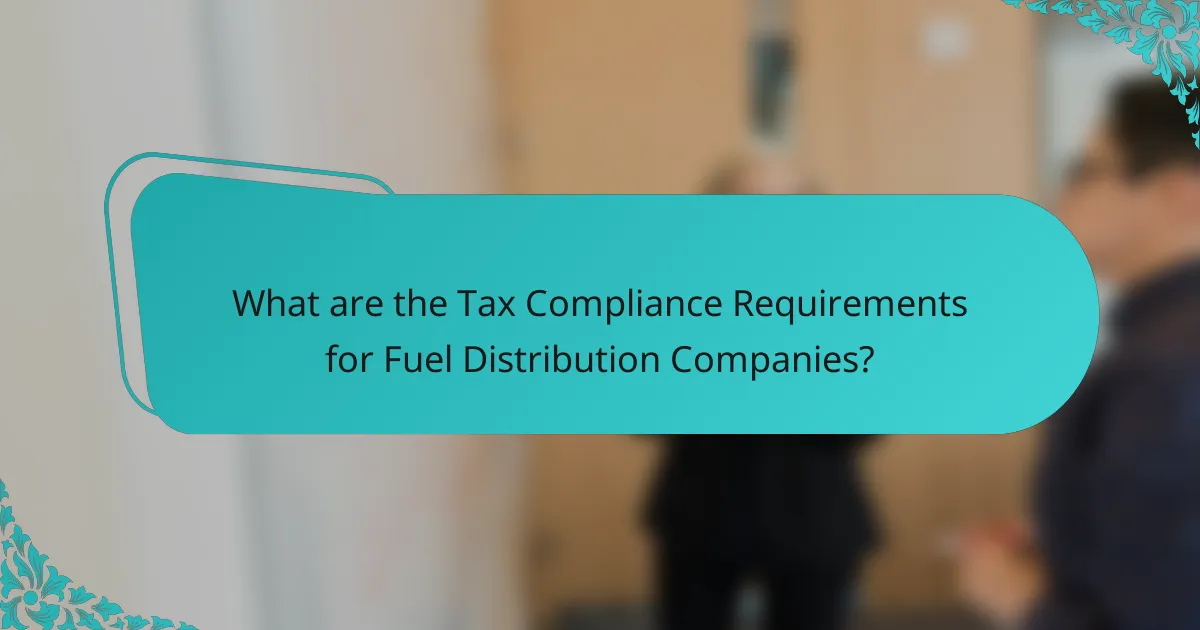
What are the Tax Compliance Requirements for Fuel Distribution Companies?
Fuel distribution companies must adhere to specific tax compliance requirements. These requirements typically include registering for applicable taxes, such as fuel taxes and sales taxes. Companies must maintain accurate records of fuel purchases and sales. They are also required to file periodic tax returns with the relevant tax authorities. Additionally, fuel distribution companies need to pay taxes on the fuel they distribute, which can vary by jurisdiction. Compliance with federal, state, and local regulations is essential. Failure to comply can result in penalties and fines, thus emphasizing the importance of understanding and meeting these requirements.
Why is tax compliance important for fuel distribution companies?
Tax compliance is crucial for fuel distribution companies to avoid legal penalties. Adhering to tax regulations ensures these companies operate within the law. Non-compliance can lead to significant fines and legal issues. Additionally, tax compliance fosters trust with regulatory bodies. It can also enhance the company’s reputation among stakeholders. Fuel distribution companies often deal with large sums of money, making accurate tax reporting essential. Inaccurate tax filings can result in audits, further complicating operations. Overall, tax compliance is vital for financial stability and operational integrity in the fuel distribution sector.
What are the potential consequences of non-compliance?
Potential consequences of non-compliance with tax regulations for fuel distribution companies include significant financial penalties. These penalties can range from a percentage of unpaid taxes to fixed monetary fines. Non-compliance can also lead to increased audits by tax authorities. This scrutiny can result in additional costs for legal fees and administrative burdens. In severe cases, companies may face criminal charges, which could lead to imprisonment for responsible individuals. Furthermore, non-compliance can damage a company’s reputation, leading to loss of business and trust among clients. Studies show that companies that comply with tax regulations benefit from reduced legal risks and enhanced credibility in the market.
How does tax compliance affect business operations?
Tax compliance significantly impacts business operations by ensuring legal adherence and financial stability. Companies that comply with tax regulations avoid penalties and legal issues. Non-compliance can result in fines, audits, and potential shutdowns. This can disrupt operations and harm a company’s reputation. Furthermore, tax compliance affects cash flow management. Businesses need to allocate funds for taxes, influencing budgeting and investment decisions. Research indicates that compliant companies often experience smoother operations and better relationships with regulatory bodies. In contrast, non-compliance can lead to operational inefficiencies and increased scrutiny from tax authorities.
What types of taxes do fuel distribution companies need to consider?
Fuel distribution companies need to consider several types of taxes. These include federal excise taxes, which are imposed on fuel sales. State fuel taxes vary by state and can significantly impact overall costs. Local taxes may also apply, depending on the jurisdiction. Environmental taxes are levied to address pollution and promote cleaner fuels. Additionally, sales taxes can be applicable based on the nature of the sale. Compliance with these tax obligations is essential for operational legality. Accurate record-keeping and timely payments are necessary to avoid penalties.
What is the federal excise tax and how does it apply?
The federal excise tax is a tax imposed by the federal government on specific goods and services. It primarily applies to fuel, tobacco, and alcohol. For fuel distribution companies, this tax is levied on the sale of gasoline, diesel, and other fuels. The rate varies based on the type of fuel. Fuel distribution companies must collect this tax from consumers at the point of sale. They are required to report and remit the collected taxes to the Internal Revenue Service (IRS). Failure to comply can result in penalties and interest charges. The federal excise tax is crucial for funding federal programs and infrastructure projects.
What state and local taxes should fuel distribution companies be aware of?
Fuel distribution companies should be aware of several state and local taxes. These include fuel excise taxes, sales taxes, and inventory taxes. Fuel excise taxes are imposed on the sale of fuel at both state and federal levels. Each state has its own specific rates and regulations regarding these taxes. Sales taxes may apply to fuel purchases in certain jurisdictions. Additionally, some localities impose inventory taxes on fuel held in storage. Compliance with these taxes is crucial for avoiding penalties. Each state’s Department of Revenue provides details on applicable tax rates and regulations.
How can fuel distribution companies ensure they meet tax compliance requirements?
Fuel distribution companies can ensure they meet tax compliance requirements by implementing robust accounting systems. These systems should accurately track fuel inventory and sales data. Regular audits can help identify discrepancies in tax reporting. Companies must stay updated on federal and state tax regulations. Training staff on compliance procedures is essential. Utilizing tax compliance software can streamline reporting processes. Engaging with tax professionals can provide expert guidance. Maintaining thorough documentation supports compliance and facilitates audits.
What documentation is needed for tax compliance?
Fuel distribution companies need several key documents for tax compliance. These include tax returns, financial statements, and invoices. Additionally, they must maintain records of fuel purchases and sales. Documentation of transportation and delivery logs is also essential. Companies should retain proof of tax payments made. This ensures accurate reporting and compliance with tax laws. Proper documentation helps in audits and reduces the risk of penalties.
How often should fuel distribution companies file tax returns?
Fuel distribution companies typically file tax returns on a quarterly basis. This frequency aligns with federal and state requirements for excise taxes on fuel. Quarterly filing allows for timely reporting and payment of taxes owed. Some jurisdictions may require monthly filings, depending on the volume of fuel distributed. Companies must also comply with any specific regulations set by the Internal Revenue Service (IRS) and state tax authorities. Accurate and timely filings help avoid penalties and interest on unpaid taxes.
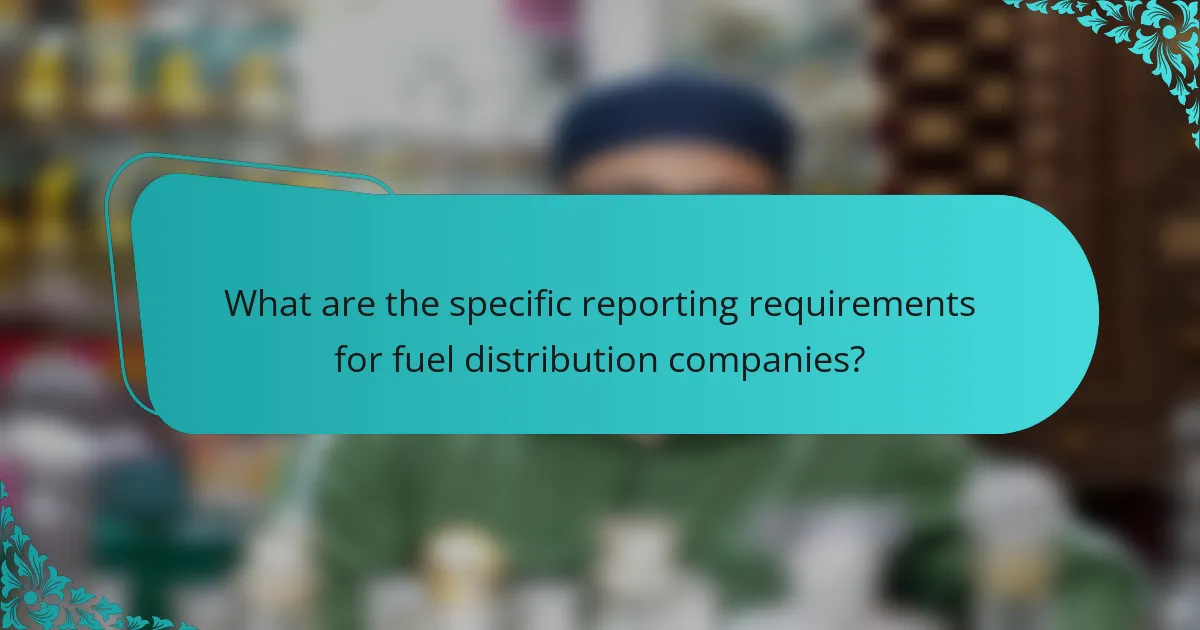
What are the specific reporting requirements for fuel distribution companies?
Fuel distribution companies must adhere to specific reporting requirements mandated by federal and state regulations. These requirements typically include submitting fuel tax returns detailing the volume of fuel distributed and the taxes owed. Companies are also required to maintain accurate records of fuel purchases, sales, and inventory levels. Additionally, they must report any fuel transfers between states, including the destination and quantity. Compliance with the Environmental Protection Agency (EPA) regulations may also necessitate additional reporting on emissions and fuel quality. Failure to comply with these reporting requirements can result in penalties and legal repercussions.
What forms must fuel distribution companies submit for tax compliance?
Fuel distribution companies must submit specific forms for tax compliance. These forms typically include the IRS Form 720 for excise taxes. Companies may also need to file state-specific fuel tax forms. Additionally, they must maintain records of fuel purchases and sales. Accurate reporting of fuel volumes is essential. Compliance ensures that companies meet federal and state tax obligations. Non-compliance can lead to penalties and fines. Each jurisdiction may have unique requirements, so companies should verify local regulations.
How do fuel distribution companies report fuel sales and usage?
Fuel distribution companies report fuel sales and usage through detailed record-keeping and submission of reports to regulatory authorities. They maintain daily logs of fuel transactions, including quantities sold and delivered. These records often include customer information, transaction dates, and locations. Companies typically use electronic reporting systems to streamline data collection and ensure accuracy.
Monthly and quarterly reports are often submitted to tax agencies, detailing total sales and usage. These reports may also include information on fuel types and any exemptions claimed. Compliance with federal and state regulations is crucial. Inaccurate reporting can lead to penalties. Proper documentation supports audits and verifies compliance with tax obligations.
What additional disclosures are required for tax purposes?
Fuel distribution companies must provide additional disclosures for tax purposes. These disclosures include detailed records of fuel purchases and sales. Companies must report the volume of fuel distributed and any tax-exempt sales. They are also required to disclose information on fuel inventories at the end of each reporting period. Additionally, companies must report any tax credits or refunds claimed. Accurate reporting of state and federal taxes paid on fuel is necessary. These requirements ensure compliance with tax regulations and help prevent tax evasion.
How do fuel distribution companies track their tax obligations?
Fuel distribution companies track their tax obligations using specialized software and accounting systems. These systems monitor fuel sales, purchases, and inventory levels. They also calculate applicable taxes based on local and federal regulations. Regular audits and reconciliations ensure accuracy in tax reporting. Many companies use electronic filing systems to submit tax returns efficiently. Compliance with the Internal Revenue Service (IRS) regulations is crucial. Companies often maintain detailed records of transactions for verification. This systematic approach helps avoid penalties and ensures timely tax payments.
What accounting practices are recommended for tax compliance?
Recommended accounting practices for tax compliance include accurate record-keeping, timely filing of tax returns, and adherence to relevant tax laws. Accurate record-keeping involves maintaining detailed financial records of all transactions. This includes sales, purchases, and expenses related to fuel distribution. Timely filing of tax returns ensures compliance with deadlines set by tax authorities. Adhering to relevant tax laws means understanding and implementing regulations specific to the fuel distribution industry. For instance, fuel taxes often have unique reporting requirements. Utilizing accounting software can streamline these processes, improving accuracy and efficiency. Regular audits can also help identify discrepancies and ensure compliance. These practices collectively support effective tax compliance for fuel distribution companies.
How can technology assist in tracking tax obligations?
Technology assists in tracking tax obligations by automating data collection and reporting processes. Software solutions can integrate with financial systems to gather transaction data in real time. This minimizes manual entry errors and ensures accuracy in tax calculations. Additionally, technology can provide alerts for upcoming tax deadlines. This helps companies remain compliant by avoiding late payments. Data analytics tools can analyze tax liabilities based on sales and distribution patterns. This enables businesses to forecast tax obligations more accurately. Cloud-based platforms offer secure storage and easy access to financial records. These features streamline audits and facilitate compliance with tax regulations.

What challenges do fuel distribution companies face in tax compliance?
Fuel distribution companies face several challenges in tax compliance. These challenges include navigating complex regulations that vary by jurisdiction. Companies must also manage fluctuating fuel tax rates, which can affect budgeting and pricing strategies. Additionally, accurate record-keeping is essential for compliance, yet it can be cumbersome and prone to errors. The industry often experiences audits, which can be time-consuming and costly. Furthermore, discrepancies in tax reporting can lead to penalties and interest charges. Keeping up with changes in tax laws adds another layer of difficulty. Lastly, ensuring that all employees are trained on compliance procedures is crucial yet challenging.
What common pitfalls lead to tax compliance issues?
Common pitfalls that lead to tax compliance issues include inadequate record-keeping, misclassification of expenses, and failure to understand tax regulations. Inadequate record-keeping can result in missing documentation during audits. Misclassification of expenses may lead to incorrect deductions, increasing tax liabilities. Failure to understand tax regulations can result in unintentional non-compliance. Additionally, poor communication with tax professionals can exacerbate misunderstandings. A study by the IRS indicates that 20% of small businesses face compliance issues due to these factors. Understanding these pitfalls helps fuel distribution companies maintain compliance and avoid penalties.
How can fuel distribution companies avoid these pitfalls?
Fuel distribution companies can avoid pitfalls by implementing robust tax compliance systems. These systems should include regular training for staff on tax regulations. Companies must also conduct frequent audits to ensure adherence to tax laws. Utilizing tax software can streamline reporting and minimize errors. Engaging tax professionals can provide expert guidance on complex regulations. Keeping accurate records is essential for demonstrating compliance during audits. Establishing a compliance calendar can help track important tax deadlines. Finally, staying informed about changes in tax legislation is crucial for ongoing compliance.
What role does employee training play in ensuring compliance?
Employee training is crucial for ensuring compliance in fuel distribution companies. It equips employees with the necessary knowledge of tax regulations and compliance requirements. Training programs help clarify legal obligations and operational procedures. This reduces the risk of non-compliance, which can lead to penalties. According to a survey by the Society for Human Resource Management, 60% of organizations that provide compliance training report lower instances of violations. Regular training updates ensure that employees stay informed about changes in tax laws. Overall, effective employee training fosters a culture of compliance within the organization.
What resources are available to assist fuel distribution companies with tax compliance?
Fuel distribution companies can access various resources for tax compliance. These include government websites that provide guidelines on fuel taxes. The IRS offers publications specifically for fuel tax regulations. Industry associations, such as the National Association of Convenience Stores, provide tax compliance resources. Tax software designed for fuel distribution can assist in calculating and filing taxes. Consulting firms specialize in tax compliance for fuel distribution companies. Webinars and training sessions on tax compliance are often available through industry organizations. These resources help ensure adherence to federal and state tax laws.
How can consulting firms help with tax compliance?
Consulting firms can assist with tax compliance by providing expert guidance on regulations. They help fuel distribution companies navigate complex tax laws. Consulting firms analyze current tax obligations and identify potential risks. They also develop strategies to ensure timely and accurate tax filings. Additionally, these firms offer training for staff on compliance best practices. Their expertise can lead to cost savings through efficient tax planning. Many consulting firms utilize technology to streamline compliance processes. This approach minimizes errors and enhances reporting accuracy.
What online tools are available for managing tax obligations?
Online tools for managing tax obligations include software like TurboTax, H&R Block, and TaxAct. These platforms offer user-friendly interfaces for filing taxes and tracking obligations. They provide features such as tax calculators and deduction finders. Additionally, services like QuickBooks and Xero help manage financial records and generate tax reports. These tools ensure compliance with tax laws and simplify the filing process. Many users report increased accuracy and time savings when using these applications. Overall, these online tools are essential for efficient tax management.
What best practices can fuel distribution companies adopt for effective tax compliance?
Fuel distribution companies can adopt several best practices for effective tax compliance. First, they should maintain accurate and detailed records of all transactions. This includes sales, purchases, and inventory. Second, companies must stay updated on tax regulations and changes in legislation. Regular training for staff on tax compliance is essential. Third, implementing robust accounting software can streamline tax reporting processes. This software should be capable of generating necessary tax documents automatically. Fourth, conducting regular internal audits can identify and rectify compliance issues proactively. Lastly, consulting with tax professionals can provide expert guidance tailored to the company’s specific needs. These practices collectively enhance compliance and minimize the risk of penalties.
How can regular audits improve tax compliance?
Regular audits can significantly improve tax compliance by identifying discrepancies and ensuring accurate reporting. They provide a systematic review of financial records and transactions. This process helps uncover errors or omissions in tax filings. Regular audits also promote adherence to tax laws and regulations. By establishing a culture of accountability, companies are more likely to comply. Furthermore, audits can deter fraudulent activities by increasing the likelihood of detection. Studies show that businesses with regular audits report higher compliance rates. For instance, a 2020 report by the IRS indicated that audited companies had a 30% lower rate of tax discrepancies. This demonstrates that regular audits are effective in enhancing overall tax compliance.
What strategies can be implemented to stay updated on tax regulations?
Subscribe to tax newsletters and updates from reputable sources. These can provide timely information on changes in tax regulations. Attend workshops and seminars focused on tax compliance. These events often feature experts discussing recent developments. Join professional organizations related to tax and finance. Membership often includes access to exclusive resources and updates. Utilize online tax compliance platforms. These tools frequently update users on regulatory changes. Follow government tax agencies on social media. They often post real-time updates on tax laws. Regularly review tax-related publications and journals. These sources provide in-depth analysis and commentary on tax issues.
Tax compliance requirements for fuel distribution companies encompass various obligations that ensure adherence to federal, state, and local regulations. Key aspects include registering for applicable taxes, maintaining accurate records of fuel transactions, and timely filing of tax returns. The article outlines the significance of compliance, potential consequences of non-compliance, types of taxes to consider, and best practices for maintaining compliance. Additionally, it discusses the role of technology and employee training in tracking tax obligations and improving operational efficiency.
